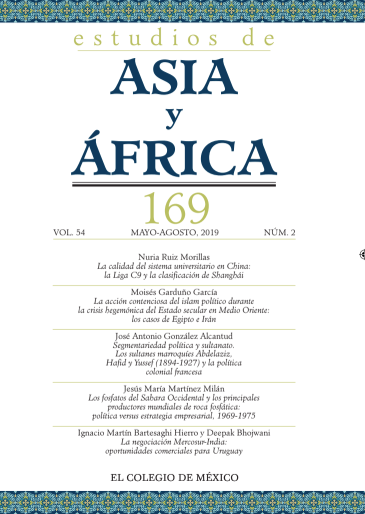Abstract
This paper makes a historical reconstruction of important events in the territory now belonging to Bhutan. The reconstruction covers events taking place up until the beginning of the 20th century, when the hereditary monarchy was established. A table will summarize the events described. Thus, this article seeks to fill a gap by taking a systematic, historical approach in the academic analysis of happiness, Buddhism and development studies in Bhutan. Not a single Spanish-language source could be found on this topic. Special attention will be paid to shifting moments in Bhutan’s history, setting up a discussion about so-called identity construction processes, especially those referring to happiness as a central political goal.References
Alay, J.L. (2002). Historia de los tibetanos. De los orígenes al conflicto actual. Lleida: Milenio.
Ardussi, J. (2005). Formation of the State of Bhutan (Brug gzhung) in the 17th century and its Tibean Antedecedents. En Cüppers, C. (ed.), Proceedings of the Seminar on The Relationship between Religion and State (chos srid zung ‘Brei) in Traditional Tibet (pp. 10-32). Lumbini: Lumbini International Research Institute.
Aris, M. (1979). Bhutan: An Early History of a Himalayan Kingdom. Warminster: Aris & Phillips, Ltd.
Aris, M. (2009). Sources for the history of Bhutan. Delhi: Motilal Banarsidass.
Baillie, L. M. (1999). Father Estevao Cacella’s Report on Bhutan in 1627. En Journal for Bhutan Studies, 1(1), pp. 1-35. Thimphu: Centre for Bhutan Studies. Recuperado de: http://himalaya.socanth.cam.ac.uk/collections/journals/jbs/pdf/JBS_01_01_01.pdf (consultado el: 27/06/2018)
Dorji, C. T. (2008). Concise religious history of Bhutan. Delhi: Prominent Publishers
Drexler, M. (2014). A Splendid Isolation: Lessons on Happiness from the Kingdom of Bhutan. California: CreateSpace.
Fundación IEPALA (2011). Guía del mundo 2011-2012. Madrid: IEPALA.
Givel, M. y Figueroa, L. (2014). Early Happiness Policy as a Government Mission of Bhutan: A Survey of the Bhutanese Unwritten Constitution from 1619 to 1729. En Journal of Bhutan Studies, 31, pp. 1-21. Recuperado de: http://www.bhutanstudies.org.bt/publicationFiles/JBS/JBS_Vol31/vol31-1.pdf (consultado el: 27/06/2018)
Kinga, S. (2009). Polity, Kingship and Democracy. A biography of the Bhutanese state. Thimphu: Bhutan Times Limited.
Learning, L. (2011). Married to Bhutan: How One Woman Got Lost, Said "I Do," and Found Bliss. California: Hay House.
McDonald, R. (2010). Taking Happiness Seriously: Eleven Dialogues on Gross National Happiness. Thimphu: The Centre for Bhutan Studies. Recuperado de: http://www.bhutanstudies.org.bt/publicationFiles/OccasionalPublications/ElevenDialoguesonGrossNationalHappines.pdf (consultado el: 27/06/2018)
Munro, L. T. (2016) Where did bhutan's gross national happiness come from? The origins of an invented tradition. En Asian Affairs, 47:1, pp. 71-92, DOI: 10.1080/03068374.2015.1128681
Phuntso, K. (2013). The history of Bhutan. Noida: Random House
Ramakant Misra, R. C. (ed.). (1998). Bhutan: society and polity. New Delhi: Indus Publishing Company.
Rigyal, S. y Prude, A. (2017). Buddhism in Contemporary Bhutan, en Jerryson, M. (ed.) The Oxford Handbook of Contemporary Buddhism. New York: Oxford University Press, pp. 61-76.
Savada A. M. (ed.). (1991). Nepal and Bhutan. A country study. EE.UU.: Federal Research Division of the Library of Congress.
Schroeder, K. (2014). The Politics of Gross National Happiness. Image and Practice in the Implementation of Bhutan’s Multidimensional Development Strategy (Tesis doctoral). Ontario: University of Guelph.
Thinley, J. Y. (2007). What is Gross National Happiness. En Journal of Bhutan Studies (número monográfico: Rethinking Development), pp. 3-13. Recuperado de: http://www.bhutanstudies.org.bt/publicationFiles/ConferenceProceedings/RethinkingDevelopment/4.Re-thinkingdev.pdf (consultado el: 27/06/2018)
Ura, K., Alkire, S., Zangmo, T., Wangdi, K. (2012). A Short Guide to Gross National Happiness Index. Thimphu: CBS&GNHr. Recuperado de: http://www.grossnationalhappiness.com/wp-content/uploads/2012/04/Short-GNH-Index-edited.pdf (consultado el: 27/06/2018)
Ura, K. (2013). The Bhutanese Development Story. Recuperado de: http://www.bhutanstudies.org.bt/publicationFiles/Monograph/mono-1en-bt-dev-stry.pdf (consultado el: 27/06/2018)
This work is licensed under a Creative Commons Attribution-NonCommercial-NoDerivatives 4.0 International License
Copyright 2022 Estudios de Asia y África



